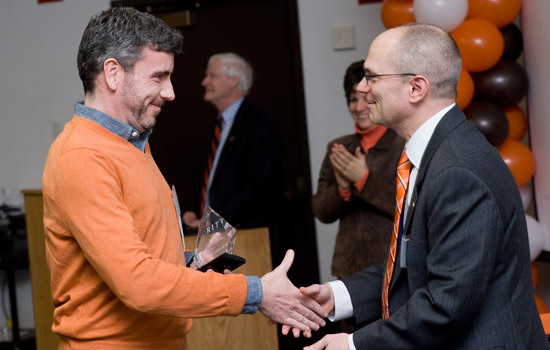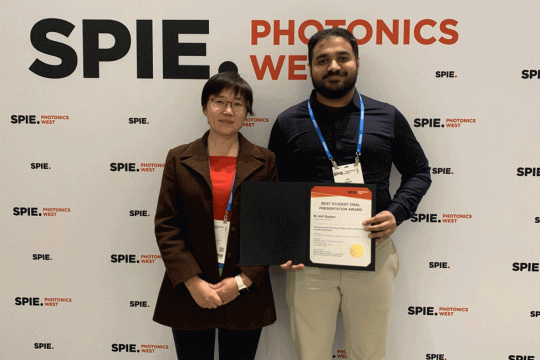RIT’s ‘PI Millionaires’ honored
University salutes 24 who have secured research funding of at least $1M
A. Sue Weisler
David Bond (right), director of sponsored research services, congratulates Peter Hauser, NTID associate professor for research and teacher education, at a ceremony in February recognizing RIT’s “PI Millionaires.” President Bill Destler is in the background. The group was honored at an April 13 dinner, sponsored by the Office of the President.
RIT’s “PI Millionaires” were saluted at a dinner Wednesday night in the University Gallery.
Each of the 24 principal investigators on funded research projects—including eight new members of the exclusive group—has secured, from a variety of sources, research support of at least $1 million since 2007.
“We do this because a million dollars represents a significant validation of expertise and commitment. You don’t achieve this level of success as an investigator by dabbling at something or by merely getting lucky,” RIT President Bill Destler told the honorees. “You achieve this through leading in some area of discovery, research or service over time. This typically includes a lot of hard work beyond teaching, publishing and other academic commitments.”
He continued: “What these faculty and staff we call millionaires have really done is made others rich. They have enriched the RIT community and their broader scientific disciplines in countless ways. Each person we honor tonight has in some way advanced discovery, solved technical problems for the benefit of the New York or U.S. economy and mentored or financially supported students.”
The new class includes:
David Borkholder, an associate professor of electrical and microelectronic engineering in the Kate Gleason College of Engineering, researches biomedical devices and the auditory systems. With funding from the National Institutes of Health, he is currently developing implantable devices for inner-ear therapies.
Robert Bowman, a professor of electrical and microelectronic engineering and an expert in semiconductor modeling, analog integrated circuits and thin-film transistors, has been funded by numerous companies, including several in New York state.
Tracy Freas, a senior staff engineer in the Center for Integrated Manufacturing Studies, has provided ergonomics and safety training and solutions to numerous companies across the state.
Peter Hauser, an associate professor for research and teacher education at NTID and a clinical neuropsychologist, studies brain and behavior relationships in hearing and deaf children and adults. His research has been funded by NIH and the National Science Foundation.
Seth Hubbard, an assistant professor of physics in the College of Science, studies improving the performance of solar cells. He received the National Science Foundation’s CAREER award last year, and he has been funded by NASA, the Department of Defense and the Department of Energy.
Brian Landi (’01, ’02, ’06), an assistant professor of chemical and biomedical engineering in the Kate Gleason College of Engineering, researches carbon nanotubes, next-generation lithium ion batteries and solar cells. His research has been funded by the Department of Defense, NYSERDA, Lockheed Martin and Tyco.
Bernadette Lynch, the director of TRiO Student Support Services, has led the program, which helps ensure the success and retention of many RIT students, since 2007.
Eli Saber, a professor of electrical and microelectronic engineering, studies digital image processing, video segmentation and object tracking. His research has been funded by Hewlett Packard and Johnson & Johnson.
The dinner was sponsored by the Office of the President.











